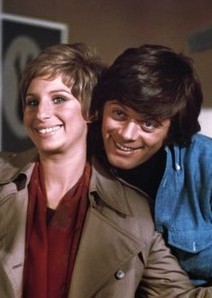Thursday, July 11, 1974.
FOR PETE’S SAKE. Written by Stanley Shapiro and Maurice Richlin. Music by Artie Butler. Directed by Peter Yates. Running time: 90 minutes. Rated General entertainment.
BARBRA STREISAND — BRASH, BRASSY and insistently energetic — is something of an acquired taste. Millions of people seem to have managed it, though, making the big-voiced Brooklyn-born singer a genuine screen sensation.
A superstar, she is virtually the only woman performer around who can draw crowds on the basis of her name alone. Her personality is a theatre-sized commodity and her talents, when properly harnessed, are boundless.
Sadly, both Barbra and her fans are shortchanged by For Pete's Sake, a TV-sized property that seems determined to turn the Oscar-winning actress into a Jewish Lucille Ball. Slow starting and rather mean-minded, the film feels like an extended episode of the long-running I Love Lucy show.
Miss Streisand plays Henrietta (Henry for short), the adoring young wife of Pete Robbins (Michael Sarrazin), a Brooklyn cab driver who is trying to get ahead by attending night school. Temperamentally unsuited to a life of poverty, Pete is enthusiastic about investing in pork-belly futures, a sure thing according to his tipster, market-wise cab dispatcher Nick (Louis Zorich).
The problem is money. Pete doesn't have any. His brother Fred (William Redfield) won't lend him any. A loan company practically laughs in his face.
It is faithful Henry who comes up with the cash — a loan from her rich uncle in Texas, she tells him. In fact, it is high-interest, pay-up-in-a-week-or-else Mob money, a loan that comes due before the pork bellies ever manage to develop any future prospects.
As in countless Lucy shows, the situation gets out of hand. Unbeknownst to her hapless husband, Henry accepts progressively more bizarre jobs in an effort to keep them clear of the shark's jaws.
The story — co-scripted by Stanley Shapiro, veteran writer of comedies for the Rock Hudson-Doris Day team during the years when their chaste chases were still big at the box-office — is a long time getting off the ground.
In order to establish the unpleasantness of poverty, Shapiro has Henry suffer through a series of indignities at the hands of people who are supposed to be at her service. Genuinely ugly both in attitude and disposition are representatives of her bank, the phone company, a supermarket and her insurance agent.
An extended build up to the arrival of her sister-in-law Helen (Estelle Parsons), a self-satisfied, truly loathsome creature, the scenes create a mood of resentment rather than humour. Their total effect is about as funny as a Ku Klux Klan cross-burning.
Things do pick up, though. Once the pork bellies are in the picture, things go pleasantly crazy.
It is then that director Peter Yates has the opportunity to put his supporting talent before the camera, and develop some comic characters.
Bringing a gentler touch to the proceedings are the diminutive Molly Picon, as a motherly madam full of concern for every member of her stable of housewife-hookers, and longtime sportscaster Heywood Hale Broun, as a judge off for an hour of mid-day dalliance.
Worth a special mention is Buddy (a police dog trained by Lew Burke) whose performance as a supercool plainclothes detective should win him a nomination for the Patsy, the canine equivalent of the Oscar.
As for Barbra, she mugs through it all manfully — if that's the right word for an actress who consistently manages to overshadow her male costars — secure in the knowledge that for countless Streisand fans it doesn't have to be good, it just has to be Barbra.
The above is a restored version of a Province review by Michael Walsh originally published in 1974. For additional information on this archived material, please visit my FAQ.
Afterword: We know what happened to Barbra. She went on to become the first woman to write, produce, direct, and star in a major American studio feature (1983's Yentl). But what about Pete, or, more precisely the performer who played Pete?
Michael Sarrazin was part of a generation of actors who made the leap from Canadian television to Hollywood studio contract players in the 1960s. After four years of TV series and feature-film supporting roles, he broke out, playing Jane Fonda’s dance marathon partner in director Sydney Pollack’s 1969 Oscar-nominated depression-era drama, They Shoot Horses, Don’t They? Thereafter he was a star, just not a particularly lucky one. None of his subsequent pictures were hits and, having never quite caught the brass ring in Los Angeles, he settled into a career as a big name in Canada’s not-so big film industry. He was still L.A.-based when he visited B.C. to star in 1972’s The Groundstar Conspiracy, and then Harry in Your Pocket (1973).
Following Jacques Michel André Sarrazin’s death in 2011, the Toronto Star’s film critic noted that the Québéc City-born actor “was often compared to Peter Fonda. The two had similar lanky good looks, shaggy hair and sleepy blue eyes. But Sarrazin was a counterculture movie star before Fonda. Sarrazin starred in The Sweet Ride in 1968, winning a Golden Globe for playing the same kind of youthful rebel Fonda would make famous with Easy Rider a year later. Sarrazin played a disillusioned surfer.” Among his later Canadian films were director Ted Kotcheff’s Joshua Then and Now (1985), Roger Cardinal’s Malarek (1988) and George Mihalka’s Québécois cult comedy La Florida (1993).
